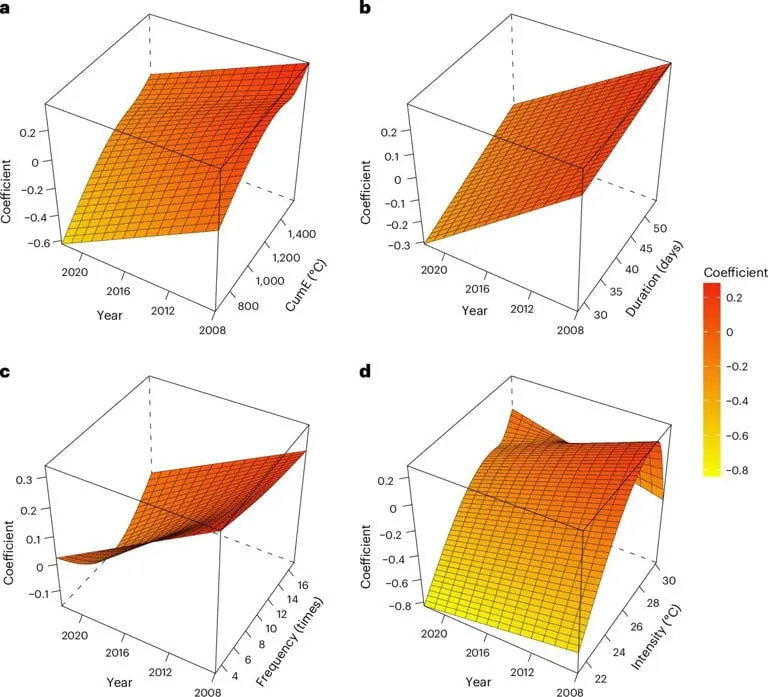Heatwaves Age Your Body Like Smoking or Drinking, 15-Year Study Finds
Want to live on a sunny beach after retirement? Think again.
Repeated exposure to heatwaves ages the human body at rates comparable to smoking cigarettes or drinking heavily, according to research that tracked nearly 25,000 adults in Taiwan for 15 years.
The study, published in Nature this week, found that for every additional 1.3 degrees Celsius of cumulative heat exposure, participants aged biologically by 0.023 to 0.031 years—roughly 8 to 11 days. Manual laborers and rural residents experienced worse effects, with outdoor workers showing biological aging of 33 days compared to about 9 to 11 days in the general population.
"While the number itself may look small, over time and across populations, this effect can have meaningful public-health implications," Cui Guo, the environmental epidemiologist at the University of Hong Kong who led the research, told Nature.
The findings represent the first comprehensive assessment of how sustained heat exposure affects the aging process at a cellular level. Previous studies focused primarily on immediate heat-related deaths, but this research reveals damage that accumulates over years, not necessarily lethal in the short term, but still detrimental to the lifespan.
How heat kills you slowly
Before understanding this research, it’s important to remember that there are at least two types of “ages” to consider: Chronological Age (how much time you have been alive) and Biological Age (does your body behave better or worse than your chronological age?).
So, let’s say you’re a rock star living a life of sex, drugs, and rock and roll. Your chronological age is 30 years, but you may have a biological age of 45 years because you cannot do the things a healthy 30 year-old does—let’s say, run for 30 minutes, breathe enough oxygen, and so on.
Researchers calculated biological age using blood pressure readings, inflammation markers, and assessments of liver, lung, and kidney function. When biological age exceeds chronological age, it signals faster physical deterioration and higher disease risk.
The study found that heat damages the body through multiple pathways. Temperature data showed that telomeres—protective caps on chromosomes—shortened with heat exposure. An increase in daily mean air temperature (about 9.5 to 10.8°C) was associated with telomere shortening ranging from 2.96% at immediate exposure to 6.69% over a two-week period.

The liver, lungs, and kidneys showed the most pronounced aging effects. The cardiovascular system proved particularly vulnerable, with older participants experiencing increased strain on the left ventricle during heat stress. Animal studies referenced in the research also documented heat-related damage to the gut and brain.
Manual workers who spend their days outdoors showed biological aging approximately three times greater than the general population under similar heat exposure. Rural communities, where air conditioning access remains limited, experienced similar disparities.
The research team observed some adaptation over the 15-year study period—the aging impact decreased slightly as participants adjusted to heat exposure. But the harmful effects never disappeared entirely. "If heatwave exposure accumulates for several decades, the health impact will be much greater than we have reported," Guo noted.
But all is not lost.
Scientists have already identified several interventions that might slow heat-related aging. Biomarkers linked to neuroinflammation and oxidative stress—including neuron-specific enolase or cortisol levels—responded within hours to days when people reduced heat exposure through cooling strategies.
If you want a less complex cheatsheet to preserve your youth, then water-based exercise proved particularly effective, keeping body temperature down while maintaining cardiovascular fitness. Adequate hydration, combined with external cooling methods like cool showers and shade-seeking, reduce internal heat load.
The timing also matters. Inflammatory markers like IL-6 and IL-10 adjusted within hours of cooling interventions. Kidney function indicators improved within days. But researchers cautioned that cumulative damage from years of heat exposure might prove harder to reverse.
So maybe you should reconsider Florida or Hawaii as retirement options. Alaska could be a healthier place.
Disclaimer: The content of this article solely reflects the author's opinion and does not represent the platform in any capacity. This article is not intended to serve as a reference for making investment decisions.
You may also like
The Base-Solana Bridge Dispute: "Vampire Attack" or Multichain Pragmatism?
The root of the contradiction lies in the fact that Base and Solana occupy completely different positions in the "liquidity hierarchy."

Stable TGE tonight: Is the market still buying into the stablecoin public chain narrative?
According to Polymarket data, there is an 85% probability that its FDV will exceed 2 billion USD on the day after its launch.

The Federal Reserve is likely to implement a hawkish rate cut this week, with internal "infighting" about to begin.
This week's Federal Reserve meeting may feature a controversial "hawkish rate cut." According to the former Vice Chair of the Federal Reserve, the upcoming 2026 economic outlook may be more worth watching than the rate cut itself.
Discover How ZKsync Fast-Tracks Blockchain Security
In Brief ZKsync Lite will be retired by 2026, having achieved its goals. ZKsync team plans a structured transition, ensuring asset security. Future focus shifts to ZK Stack and Prividium for broader application.

